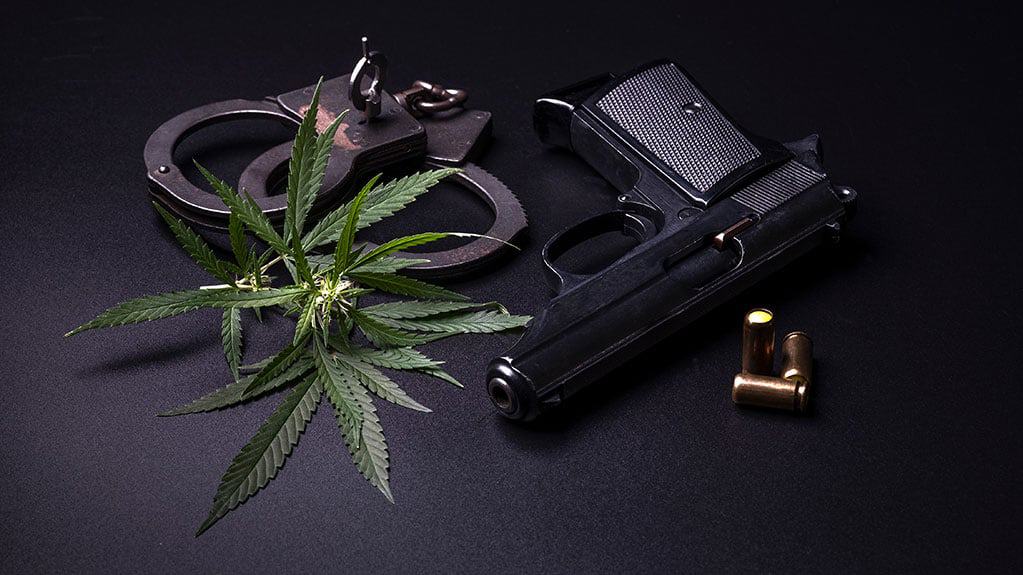The Trump administration’s latest legal maneuver has brought renewed attention to a growing conflict in federal law where gun rights and drug policy intersect, potentially placing millions of Americans at risk of criminal prosecution.
At the heart of the issue is 18 U.S.C. § 922(g)(3), a statute that criminalizes firearm possession by anyone deemed an “unlawful user” of a controlled substance. The Department of Justice is now urging the Supreme Court to uphold this restriction, even as marijuana legalization expands across 24 states and federal agencies consider reclassifying the drug. Millions of Americans, especially lawful gun owners in states with legal cannabis, could face federal prosecution under a policy that hasn’t kept pace with shifting laws and public norms.
On August 11, 2025, the DOJ filed a petition asking the Supreme Court to resolve conflicting lower court rulings on § 922(g)(3). The Fifth Circuit previously ruled that disarming a sober person based solely on past marijuana use violates the Second Amendment under the Bruen standard. Meanwhile, the Eighth Circuit suggested the ban might be unconstitutional in certain cases, and the Tenth Circuit is reviewing a district court decision that struck it down entirely.
No hearing date has been set, but the Court’s October 2025 term is the earliest likely window for action. Solicitor General Elizabeth Prelogar’s office is expected to file additional briefs soon.
“History and tradition only supports a ban on carrying firearms while intoxicated,” Hemani’s lawyers argued. “They do not support disarming a sober person based solely on past substance usage”.
The DOJ disagrees, claiming that historical laws restricted habitual drinkers—even when sober—and that modern drug laws have long barred addicts from owning guns:
“For about as long as legislatures have regulated drugs, they have prohibited the possession of arms by drug users and addicts—not just by persons under the influence of drugs,” DOJ attorneys wrote in their Supreme Court filing.
Hemani’s legal team highlighted the staggering implications: roughly 19% of Americans use marijuana, and 32% own firearms. That means millions may be violating federal law without knowing it. This carries a penalty of up to 15 years in prison.
“The government’s interpretation of the law makes no sense,” Hemani’s attorneys wrote. “Millions of Americans are violating the law that could put them behind bars for up to 15 years”.
Reclassification Paradox: The Administration’s Mixed Signals
Just last week, we published a deep dive into Congressman Greg Steube’s Marijuana 1-to-3 Act—a bill that would reclassify marijuana from Schedule I to Schedule III under federal law. While headlines call it a step toward legalization, we warned it’s actually a handoff to Big Pharma and corporate cannabis giants.
Now, Trump’s own DOJ is defending a gun ban that hinges on marijuana’s classification as a dangerous drug. If the administration moves forward with reclassification, it could undermine the very rationale for the ban under § 922(g)(3). Conversely, upholding the ban could stall reclassification efforts by reinforcing marijuana’s criminal status.
This issue has rightfully sparked fierce debate. Research from the Journal of Psychoactive Drugs (2021) shows marijuana users exhibit lower aggression than alcohol users, challenging the DOJ’s public safety argument. Organizations like the NRA and NORML are expected to file amicus briefs, and the pro-2A base is already pushing back.
Meanwhile, the administration touts a federal program to restore gun rights, while defending a law that strips them away from millions. Talk about whiplash!
This case is a wake-up call and it raises urgent questions:
- Should federal law override state marijuana legalization when it comes to gun rights?
- Can past drug use justify permanent disarmament?
- Are we criminalizing millions based on outdated or inconsistent standards?
The Supreme Court may take up the issue this fall. In the meantime, it’s up to us to stay informed, demand transparency, and speak out for reform and constitutional accountability.
If you believe in defending constitutional rights and exposing the contradictions in federal law, we need your support. Your donation helps us educate the public, mobilize grassroots action, and hold policymakers accountable. Every dollar fuels the fight for transparency, reform, and liberty. Donate now and stand with us.


